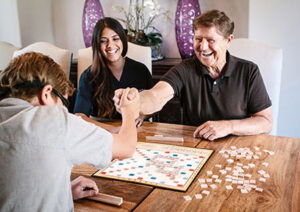June is Alzheimer’s and Brain Awareness Month, a time to shine a light on the range of cognitive disorders that predominantly affect our senior community. Alzheimer’s and dementia are progressive diseases that touch many U.S. families, as an estimated 11.5 million family members and other unpaid caregivers assist seniors and older adults diagnosed with dementia or Alzheimer’s.
Notably, research reveals that the symptoms and progression of dementia and Alzheimer’s conditions can differ between women and men. The Alzheimer’s Association reports that:
- Of the nearly 7 million U.S. seniors aged 65 and older living with Alzheimer’s, nearly 4 million are women.
- Statistics show that women in their 60s are about twice as likely to develop Alzheimer’s over the course of their remaining years as they are to develop breast cancer.
- The discrepancy between men and women diagnosed with Alzheimer’s is due to the fact that on average women live longer than men and older age is the greatest risk factor for the disease.
The number of people living with Alzheimer’s or dementia is expected to climb to 14 million by 2060, making it crucial for caregivers, family members and the wider community to recognize symptoms and adopt effective management strategies to improve the quality of life for those affected.
How Dementia and Alzheimer’s Symptoms Differ in Women and Men
The battle against Alzheimer’s and dementia takes on a unique shape in men and women due to biological, genetic and even social factors. While both genders can develop these conditions, it’s important to note that women are statistically at a higher risk of developing Alzheimer’s.
For Women:
Earlier onset of memory loss: Women often show symptoms of memory loss earlier than men. They might forget familiar names or recent events, which is typically one of the initial signs of cognitive decline.
Greater verbal memory retention: Paradoxically, women tend to retain verbal memory skills longer than men, which can sometimes obscure the severity of their condition.
Emotional and mood changes: Women with Dementia or Alzheimer’s may experience more significant mood swings and become more easily upset or anxious than their male counterparts.
For Men:
Challenges with spatial awareness: Men may show greater difficulties with visual-spatial tasks, such as misjudging distances or getting lost in familiar places.
Less noticeable memory loss: Since men may start with a lower baseline of verbal memory skills, the decline might seem less apparent and may not be noticed as quickly.
Physical manifestations: Men are more likely to exhibit physical symptoms such as rigidity or physical agitation.
It is also important to address that men with dementia are typically diagnosed at a later stage than women, which has significant implications for the management of the condition.
Memory Loss Symptoms in Seniors to Take Seriously
Spotting the early signs of dementia and Alzheimer’s can lead to earlier intervention, which may help slow the progression of symptoms. Regardless of gender, here are some symptoms that should be taken seriously:
- Frequent memory loss affecting daily life
- Challenges in planning or solving problems
- Difficulty completing familiar tasks at home or work
- Confusion with time or place
- Trouble understanding visual images and spatial relationships
- Problems with words in speaking or writing
- Misplacing things and losing the ability to retrace steps
- Decreased or poor judgment
- Withdrawal from work or social activities
- Changes in mood and personality
- Suggestions for Managing Symptoms
At Amada Senior Care, we believe in a personalized, compassionate approach to managing Alzheimer’s and dementia symptoms, with strategies that cater to each individual’s experiences and needs.
Create a Routine: Maintain a simple, structured daily routine to provide a sense of stability.
Promote a Healthy Lifestyle: Encourage regular exercise, a balanced diet, and adequate sleep.
Mental Stimulation: Engage in activities that stimulate the mind, such as puzzles, reading, or memory games.
Social Interaction: Facilitate social engagement to combat isolation, which can accelerate cognitive decline.
Safety Measures: Modify living spaces to reduce the risk of injury, such as installing grab bars and removing trip hazards.
Communication Techniques: Use clear, straightforward communication and remain patient, providing reassurance when needed.
Professional Support: Consider home care services that specialize in non-medical support for individuals with Alzheimer’s and dementia.
Empathy and Support Needed for Seniors Living with Dementia or Alzheimer’s
As we observe Alzheimer’s and Brain Awareness Month, let’s remember the importance of recognizing the gender differences in dementia and Alzheimer’s symptoms, taking early signs seriously, and implementing tailored management strategies. By spreading awareness and understanding, we can ensure our loved ones receive the empathy and support they need to navigate life with dignity and as much independence as possible.
By Michelle Flores
Amada blog contributor
June 7, 2024















